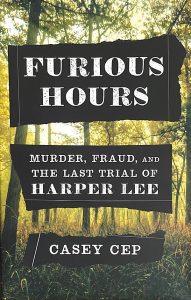Review of “Furious Hours: Murder, Fraud, and the Last Trial of Harper Lee” by Casey Cep
- June 25th, 2020
- by specialcollections
- in Book Notes, Guest Contributors
This post by Andrew Toler is an addition to our series of Alabama book notes. Toler is a 2020 graduate of the University of Alabama School of Law and worked with Litera Scripta editors as a research assistant in the special collections and archives of the Bounds Law Library.
Review of Furious Hours: Murder, Fraud, and the Last Trial of Harper Lee by Casey Cep
By Andrew Toler
Before the publication of Go Set a Watchman—only eight months before her death—the literary community had come to accept the fact that Harper Lee would likely publish only one book. Upon hearing the news that Lee would, in fact, publish another book, many residents of Alexander City, Alabama assumed that it would be the one that she had worked on for decades about one of the Tallapoosa County city’s most infamous residents.
The book, which Lee abandoned for good in 1987, would obviously never see the light of day—under Lee’s name, at least. In her first book, Casey Cep brings to life both the story that Lee wanted to tell in The Reverend (Lee’s working title for the unfinished book) as well as the story of Lee: her life, struggles, relationships, and complexities. In three parts and 23 digestible chapters, Cep brings to life the story of three main people: the Reverend Willie Maxwell, his attorney Tom Radney, and Harper Lee, the famous author who attempted to write a true crime story about the Maxwell case.
The story that Lee wanted to turn into a true crime book in the style of In Cold Blood—which she helped research with its author, her longtime friend Truman Capote—is chillingly told by Cep in the first part of Furious Hours. Born in 1925, the Reverend Willie Maxwell was a tradesman and lay Baptist minister in Tallapoosa County, Alabama. Although at first respected in the small communities of Tallapoosa County, suspicion began to swirl around Maxwell after several of his relatives and associates—five before he was through—died under suspicious circumstances. The suspicion in the community included allegations of voodoo practices: unfounded allegations that were likely rooted in racism against African-Americans, but which the media—both local and national—devoured. Instead of voodoo, the most likely cause of the deaths was the dark power of life insurance, as Maxwell had life insurance policies on every single victim of the suspicious deaths. As a matter of fact, Maxwell was often in dire financial straits during the time of the deaths—which ranged from 1969-1977. Although the story is better told by Cep, the string of deaths of those close to Maxwell finally came to an end in 1977 with his own abrupt demise—shot to death at the funeral of his last victim.
Before his death, however, Maxwell needed his insurance money. And many life insurance companies refused to pay him, given the suspicious nature of the deaths of those on whom the Reverend held insurance. So the Reverend turned to the courts to get the money that he felt he was owed. Tom Radney, the lawyer that helped Maxwell sue the insurance companies—and also successfully defended him against charges of homicide related to the deaths—is the centerpiece of the second part of Cep’s work.
